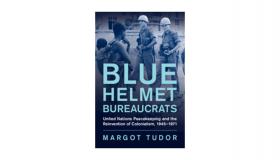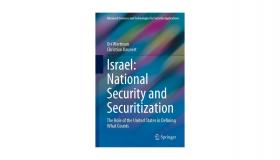
Breadcrumbs navigation
The latest in IR - spring book round up
Welcome to our quarterly book round up. Each quarter we bring you updates on the latest International Studies releases by BISA members. To be included in the next update contact Communications Manager, Chrissie Duxson: Chrissie.Duxson@bisa.ac.uk
Peace and Reconciliation in International and Islamic Law
By Kaleem Hussain

Kaleem Hussain is a British writer, multi-disciplinary change management consultant and geo-political observer with an interest in the intersection of religion in public life, politics and international relations as well as programmes and initiatives fostering peaceful coexistence and reconciliation at a national and international level.
Blurb
In an age where the global rules-based world order faces significant challenges to maintaining peace and stability—with world superpowers jockeying to preserve their influence across multiple theatres of conflict—this book explores the major international laws and treaties governing the process of peace and reconciliation. Focusing on the conflicts in Afghanistan, Palestine-Israel and Kashmir, it examines and analyses these conflicts through the prism of international law, humanitarian norms, treaties, and conventions, interspersed with insights from the Islamic legal tradition.
An innovative approach to the problem of conflict resolution is applied by a) reviewing the jurisprudential sources and tools that are used in international and Islamic law, and b) using a comparative analysis to provide an assessment of whether these sources help or hinder—individually or collectively—the chances for peace and reconciliation in specific global conflict theatres. It also explores how by supplementing these legal tools using principles of Islamic peacebuilding along with a theo-diplomatic conflict reconciliation model could assist in the brokering of peaceful outcomes.
Find out more and purchase the book via the Cambridge Scholars website. Use the code PROMO25 for a 25% discount.
The Covert Colour Line
The Racialised Politics of Western State Intelligence
By Oliver Kearns

Oliver Kearns is a research fellow with SPIN, the Secrecy Power and Ignorance Network, at the University of Bristol, UK. He studies how state secrecy, from drone strikes to spy radio frequencies, shapes the legitimation of violence. He also writes experimental electronic music.
Blurb
Repeated intelligence failures in Iraq, Libya and across the Middle East and North Africa have left many critics searching for a smoking gun. Amidst questions of who misread - or manipulated - the intel, a fundamental truth goes unaddressed: western intelligence is not designed to understand the world. In fact, it cannot.
In The Covert Colour Line, Oliver Kearns shows how the catastrophic mistakes made by British and US intelligence services since 9/11 are underpinned by orientalist worldviews and racist assumptions forged in the crucible of Cold War-era colonial retreat. Understanding this historical context is vital to explaining why anglophone state intelligence is unable to grasp the motives and international solidarities of 'adversaries'.
Offering a new way of seeing how intelligence contributes to world inequalities, and drawing on a wealth of recently declassified materials, Kearns argues that intelligence agencies' imagination of 'non-Western' states and geopolitics fundamentally shaped British intelligence assessments which would underpin the 2003 invasion of Iraq and subsequent interventions.
Find out more and purchase the book via Pluto books.
Contemporary Reflections on Critical Terrorism Studies
Edited By Alice Martini and Raquel da Silva

Raquel da Silva is Assistant Professor of International Relations at the School of Economics, University of Coimbra and Integrated Researcher at CEI-Iscte. She is the author of Narratives of Political Violence: Life Stories of Former Militants (2019). In addition to being a BISA member, Raquel has previously convened the Critical Studies on Terrorism Working Group.
Blurb
Bringing together established and emerging voices in Critical Terrorism Studies (CTS), this book offers fresh and dynamic reflections on CTS and envisages possible lines of future research and ways forward.
The volume is structured in three sections. The first opens a space for intellectual engagement with other disciplines such as Sociology, Peace Studies, Critical Pedagogy, and Indigenous Studies. The second looks at topics that have not received much attention within CTS, such as silences in discourses, the politics of counting dead bodies, temporality or anarchism. The third presents ways of ‘performing’ CTS through research-based artistic performances and productions. Overall, the volume opens up a space for broadening and pushing CTS forward in new and imaginative ways.
Find out more and purchase the book via the Routledge website.
Handbook on the Politics of Memory
Edited by Maria Mälksoo

Maria Mälksoo is an Associate Professor at the Centre for Military Studies, Department of Political Science, University of Copenhagen. She will part of the new editorial team for BISA journal European Journal of International Security from January 2024.
Blurb
Providing a novel multi-disciplinary theorization of memory politics, this insightful Handbook brings varied literatures into a focused dialogue on the ways in which the past is remembered and how these influence transnational, interstate, and global politics in the present.
With case studies from Africa, East and Southeast Asia, Europe, South America, and the United States, the Handbook focuses on the political features of historical memory in international relations. Chapters examine key concepts of memory politics, including accountability, commemoration and memorialization, the Europeanization of memory, and the politics of trauma and victimhood, as well as analyzing different sites of memory, from the human body and memorial sites to media, film, and television. It also answers essential questions such as who and what determines the relevance of the past in the present; how does memory become a political question; and what are the political effects and ethical implications of its mobilization?
Find out more and purchase the book from the Edward Elgar Publishing website.
Blue Helmet Bureaucrats
United Nations Peacekeeping and the Reinvention of Colonialism, 1945–1971
By Margot Tudor

Margot Tudor is a postdoctoral research fellow at University of Exeter. She won the BISA Michael Nicolson Thesis Prize in 2021 and her article, 'Gatekeepers to Decolonisation', won the ISA History Section's Merze Tate Award in 2022.
Blurb
This history of colonial legacies in UN peacekeeping operations from 1945–1971 reveals how United Nations peacekeeping staff reconfigured the functions of global governance and sites of diplomatic power in the post-war world. Despite peacekeeping operations being criticised for their colonial underpinnings, our understanding of the ways in which colonial actors and ideas influenced peacekeeping practices on the ground has been limited and imprecise. In this multi-archival history, Margot Tudor investigates the UN's formative armed missions and uncovers the officials that orchestrated a reinvention of colonial-era hierarchies for Global South populations on the front lines of post-colonial statehood. She demonstrates how these officials exploited their field-based access to perpetuate racial prejudices, plot political interference, and foster protracted inter-communal divisions in post-colonial conflict contexts. Bringing together histories of humanitarianism, decolonisation, and the Cold War, Blue Helmet Bureaucrats sheds new light on the mechanisms through which sovereignty was negotiated and re-negotiated after 1945.
Find out more and purchase the book from Cambridge University Press.
War on the Ballot
How the Election Cycle Shapes Presidential Decision-Making in War
By Andrew Payne

Andrew Payne is a departmental lecturer in international relations at the University of Oxford, where he was previously the Hedley Bull Research Fellow in International Relations and a William Golding Junior Research Fellow at Brasenose College. He serves on the board of Chatham House in London.
Blurb
The president of the United States is at once holder of the highest elected office and commander in chief of the armed forces. How do upcoming elections influence presidents’ behavior during wartime? How do presidents balance perceptions of the national interest with personal political interests?
War on the Ballot examines how electoral politics shaped presidential decisions on military and diplomatic strategy during the wars in Korea, Vietnam, and Iraq. Drawing on a wealth of declassified documents and interviews with senior officials and military officers, Andrew Payne reveals the surprisingly large role played by political considerations during conflicts. He demonstrates how the exigencies of the electoral cycle drove leaders to miss opportunities to limit the human and financial costs of each war, gain strategic advantage, or sue for peace, sometimes making critical decisions with striking disregard for the consequences on the ground. Payne emphasizes the importance of electoral pressures throughout the full course of a conflict, not just around the initial decision to intervene. He shows how electoral constraints operate across different phases of the political calendar, going beyond the period immediately preceding a presidential election.
Offering a systematic analysis of the relationship between electoral politics and wartime decision-making, this book raises crucial questions about democratic accountability in foreign policy.
Find out more and purchase the book from the Columbia University Press website. You can get 20% off with the code CUP20.
Israel: National Security and Securitization
The Role of the United States in Defining What Counts
By Christian Kaunert and Ori Wertman

Christian Kaunert is Professor of International Security at Dublin City University, Ireland. He is also Professor of Policing and Security, as well as Director of the International Centre for Policing and Security at the University of South Wales. He holds a Jean Monnet Chair and is the Director of the Jean Monnet Centre of Excellence and the Jean Monnet Network of Excellence in EU Counter-Terrorism EUCTER.
Blurb
This book is the first comprehensive, book-length analysis of Israel and securitization processes. It develops an original analytical framework to ameliorate the theoretical understanding of the audience component during the securitization process, drawing upon insights from both securitization theory, political psychology, and IR theory. This gives us significant new insights into why some audiences are essential to be persuaded for securitization to occur, while others are not. This book also examines the role of the United States in defining what matters in Israeli National Security. In essence, since the United States is Israel's most significant ally, it is essential for the Israeli leadership to gain the American government's support (or its lack of resistance) for almost any securitization acts. The book analyses a highly original set of interviews with prominent figures in Israel who were at the top level of the Israeli decision-making process, including members of the political and military echelons.
Find out more and purchase the book via the Springer website.
If you're a BISA member and you'd like your book included in next quarter's round up, email Communications Manager, Chrissie Duxson: Chrissie.Duxson@bisa.ac.uk. Please include the title, blurb and a link to where the book can be purchased. If you are able, you can also include details of any discount available, but of course this is not required. The book should have been published a maximum of six months prior to your email.
Top photo by Phil Hearing on Unsplash


